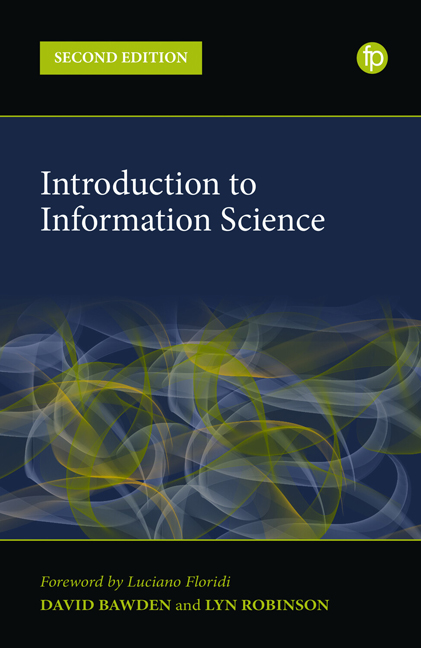Book contents
- Frontmatter
- Contents
- Figures
- Preface
- Foreword – Curators of Semantic Capital
- List of Acronyms
- 1 The Information Science Discipline
- 2 History of Information: the Story of Documents
- 3 Philosophies of Information
- 4 Paradigms, Turns and Theories in the Information Sciences
- 5 Information
- 6 Documents and Documentation
- 7 Domain Analysis
- 8 Information Organisation
- 9 Digital Technologies and Data Systems
- 10 Information Systems
- 11 Informetrics
- 12 Information Behaviour
- 13 Communicating Information: Changing Contexts
- 14 Information Management and Policy
- 15 Information Law and Ethics
- 16 Information Society
- 17 Digital (Onlife) Literacies
- 18 Research in the Information Sciences
- 19 The Future of the Information Sciences
- Additional Resources
- Index
5 - Information
Published online by Cambridge University Press: 21 April 2022
- Frontmatter
- Contents
- Figures
- Preface
- Foreword – Curators of Semantic Capital
- List of Acronyms
- 1 The Information Science Discipline
- 2 History of Information: the Story of Documents
- 3 Philosophies of Information
- 4 Paradigms, Turns and Theories in the Information Sciences
- 5 Information
- 6 Documents and Documentation
- 7 Domain Analysis
- 8 Information Organisation
- 9 Digital Technologies and Data Systems
- 10 Information Systems
- 11 Informetrics
- 12 Information Behaviour
- 13 Communicating Information: Changing Contexts
- 14 Information Management and Policy
- 15 Information Law and Ethics
- 16 Information Society
- 17 Digital (Onlife) Literacies
- 18 Research in the Information Sciences
- 19 The Future of the Information Sciences
- Additional Resources
- Index
Summary
It is hardly to be expected that a single concept of information would satisfactorily account for the numerous possible applications of this general field.
Claude Shannon (1993, 180)Almost every scientific discipline uses the concept of information within its own context and with regard to specific phenomena … There are many concepts of information, and they are embedded in more or less explicit theoretical structures
Rafael Capurro and Birger Hjørland (2003, 356 and 396)Information is in everything. It has become the foremost concept in biology, physics, economics, engineering, philosophy, decision-making, methodology of science, artificial intelligence, computer science, etc. Naturally, in different domains, information appeared in different forms and shapes, which depend on the context and environment … Due to such a diversity of information forms and shapes, researchers have built many specialized information theories trying to reflect important aspects of information
Mark Burgin and Wolfgang Hofkirchner (2017a, 1)Introduction
Information is a complex and contested concept. It is central to information science, but it is also important in many other disciplines, in the physical sciences, in the biological sciences, in computing and communication technology and in the social sciences. It is reasonable to ask whether the concept of information is in some sense ‘the same’ in all of these, or if it is just a coincidence that the same English word is used for different things. The word has had a number of different meanings over the years. Its entry in the Oxford English Dictionary (March 2021 edition) gives its current meanings as the imparting of knowledge, or the giving of form or character to something. The former is what is usually understood in the information sciences, the latter is relevant to wider uses of the term. As the quotation from Shannon, the originator of information theory, reminds us, we should not expect to find a single, simple idea of information which will do in all circumstances.
One reason for this complexity is that information may be discussed and analysed at a number of different levels. For example, Liebenau and Backhouse (1990) show that any communication of information can be understood simultaneously at four levels:
• empiric: the physical transmission
• syntactic: the language or coding used
• semantic: the meaning of the message
• pragmatic: the significance of the message to a recipient in a particular context.
- Type
- Chapter
- Information
- Introduction to Information Science , pp. 81 - 98Publisher: FacetPrint publication year: 2022



